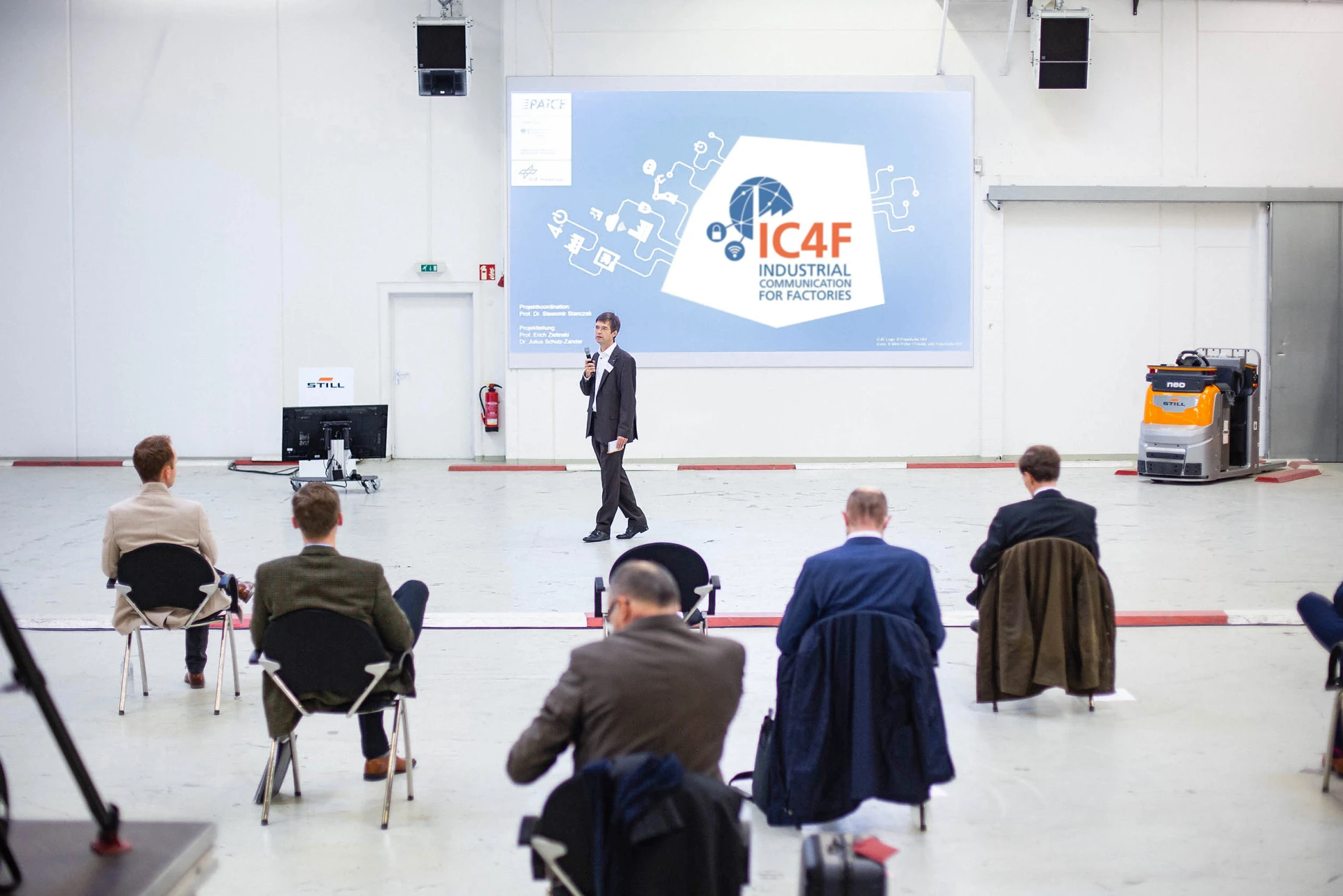Secure data exchange in the age of industry 4.0
Hamburg, 23 October 2020 - Networked production processes and digital factories provide an important key to securing Germany's competitiveness and innovative strength as a business centre. This is the subject of the lighthouse project IC4F - Industrial Communication for Factories - in which STILL has been significantly involved for almost three and a half years. The Hamburg-based intralogistics provider also hosted the final event, at which the results achieved with the project partners were presented on October 22nd.

For years, everyone has been talking about the future project Industry 4.0. However, essential tools for putting the new industry standard into practice are still lacking. The PAiCE support programme (Platforms, Additive Manufacturing, Imaging, Communication, Engineering) of the Federal Ministry of Economics and Technology is intended to remedy this situation. An associated lighthouse project is IC4F (Industrial Communications for Factories), in which the Hamburg intralogistics company STILL is playing a major role. "The 15 project partners from industry and research - including Robert Bosch GmbH, Siemens, Deutsche Telekom AG and Nokia - have spent the past three and a half years developing a technology kit for a trustworthy industrial communication and computing infrastructure," explains Ansgar Bergmann, project manager at the Technology & Innovation department, who is responsible for STILL's share of the project. This technology kit is based on an open architecture and allows modular extensions for new applications and communication technologies. Bergmann: "The results of our research will enable users to select suitable information and communication technologies according to industry 4.0 requirements and a specific migration approach". These secure, robust and real-time communication solutions for the manufacturing industry will use key technologies from the areas of 5G, multi-access edge computing (MEC), cloud computing, virtualisation, industrial monitoring and analytics.
In the midst of things instead of just part of it
Ansgar Bergmann is particularly proud of the fact that STILL not only "simply took part" in this project, but was able to contribute their expertise to the fullest extent and decisively influence the development. "We have put our wealth of experience, which we have in the areas of industrial networking and Industry 4.0, to good use. In doing so, we benefited from the fact that we have already helped to develop several industry guidelines on behalf of the Federal Government and the VDMA in the past," says the STILL expert. At the same time the Hamburg intralogistics company was also able to benefit from participating in the IC4F project. Bergmann: "First of all we proved to ourselves that we know how to successfully network processes in the warehouse and that our approaches work. In addition, we were able to gain many new insights, which we will now use in the cooperation with our customers to the benefit of both sides".
Live demonstrations to underscore project success
On October 22, this work was provisionally completed. STILL invited project partners and internal stakeholders to the company headquarters on the Elbe. There, Nokia set up a mobile radio campus network, which was specially required for the project implementation and which will also serve as a pioneer for new communication technologies such as 5G. In several live demonstrations the equally important and groundbreaking results of the project work were then presented. One of the live demonstrations ("Use Case Truck-to-X Communication"), which was mainly developed by STILL, dealt for example with door control in a factory hall. In this use case both forklift trucks and other factory installations were integrated into a common communication environment. The indoor localisation system supplied the position data of the forklift trucks, which were then processed by various applications of the partners involved in the live demonstration. In this example, the door control was carried out purely from a virtual world. The door opened automatically as soon as a forklift truck approached it. This door control was implemented as a so-called administration shell. For this purpose, digital twins were generated from the forklift truck and the gate. In the submodels of the administration shell, all physical properties of the forklift and the gate, also called assets in this context, were then made permanently available. The virtual model, which also controlled the processes, was thus continuously able to compare these data and, for example, to open the door only when the dimensions of the forklift really fit through. In addition, the truck's drive control is accessed and the driver is warned. Door damage as it occurs today would thus be a thing of the past.
Excellent customer benefit
During the event in Hamburg, several live demonstrations and a number of new or extended industrial use cases were shown, such as the "Bring your Own Network" approach developed by Siemens to facilitate the installation of Multi Tennant networks in companies, or a modern "Certificate Management via the Cloud" solution by Telekom, which increases both security and convenience in the field of industrial communication. "These proof-of-concept implementations serve to test the methodology and validate the use cases," says Ansgar Bergmann. However, the STILL expert is firmly convinced that much of the knowledge and experience gained from the IC4F project will also be incorporated into industrial applications later on and will be of great benefit to STILL's customers. Ansgar Bergmann is convinced that "with this experience as a basis we are the ideal partner when it comes to industrial 4.0 topics or warehouse networking."

